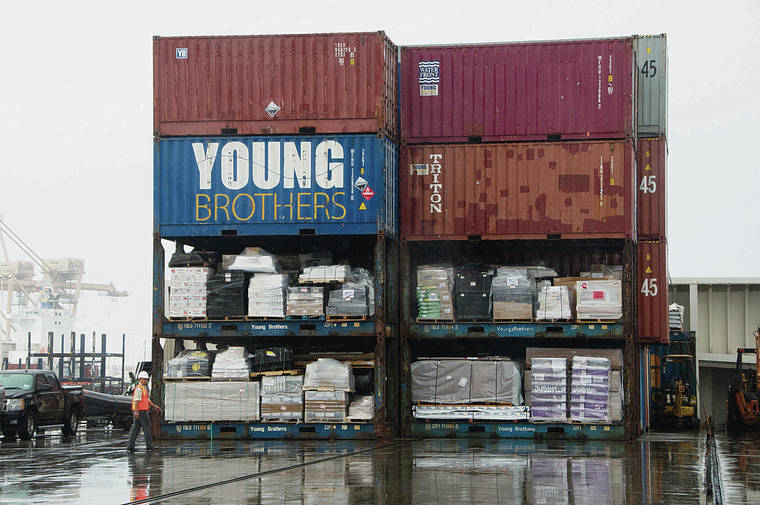Editorial: Take hard look at Young Brothers plea for coronavirus relief aid

STAR-ADVERTISER FILE
Hawaii can’t afford to let Young Brothers go bankrupt and cease interisland shipping.
By the time much of Hawaii’s cargo reaches its final destination, Young Brothers LLC has touched it at some point. So alarm bells clanged loudly when the interisland shipper announced that the pandemic-related economic slump has pushed the company to the brink of its own shutdown.
Even so, the lawmakers who are currently holding the purse strings of the federal COVID-19 Opens in a new tab relief funds will have to do their due diligence in vetting the request from Young Brothers for $25 million in CARES Act money.
The shipper is a monopoly, regulated by the state Public Utilities Commission, disseminating cargo brought into Hawaii as well as transporting goods originating within the state to other islands. It deploys eight barges, employs about 370 workers and runs the operation for about $130 million annually.
Its president, Jay Ana, wrote in a letter to government leaders on Tuesday that its parent company, Saltchuk Resources Inc., would stop covering cash shortfalls for operating expenses after the month ends on Sunday.
The residents and businesses of the state, especially those on the neighbor islands, could not sustain the body blow a shipping disruption would cause, on top of the damage resulting from the coronavirus crisis. So the request for emergency aid must be taken seriously. But Young Brothers’ financial woes predate the pandemic by years, partly because of its own mismanagement of its rate structure, leading to annual losses.
When Ana and his team make their formal pitch to state lawmakers, they must lay out exactly how the state shutdown due to COVID-19 caused the damage the company hopes to recoup through federal funds.
Don't miss out on what's happening!
Stay in touch with breaking news, as it happens, conveniently in your email inbox. It's FREE!
In November, Young Brothers submitted a request for a 34% rate increase to the PUC; the docket in which it makes its case is still pending before the commission. PUC rules entitle utilities to a reasonable rate of return, which can justify a rate increase.
In a meeting with the Honolulu Star-Advertiser editorial board that month, Young Brothers executives acknowledged that part of the problem was its own failure to request any incremental rate increases for the past five years.
Even before the coronavirus began its global spread, the company had projected a $12.3 million loss this year. Executives had hoped the proposed hefty rate hike would head off that load of red ink, which was being poured on top of losses of $10 million and $11 million the previous two years.
Why had the company failed to stave off these losses with more modest, gradual increases over the years?
“We lost our way,” Paul Stevens told the editorial board in November. Stevens, senior vice president at Saltchuk, took charge of Young Brothers on an interim basis.
While it’s true, as Stevens said at the time, that customers saved on rate increases in the intervening five years, it’s untenable for businesses to sustain such a large rate hike, all at once. Companies need to be able to plan their own expenses over the long term and should not be hit a sudden burden, especially as that should have been avoidable.
The bottom line is this: Hawaii can’t afford to let Young Brothers go bankrupt and cease interisland shipping. To the extent that losses are due to the state shutdown, lawmakers should appropriate federal relief funds to the company when it reconvenes in mid-June.
But to the extent that the losses accrue from ongoing management problems, the state could offer a loan that can be repaid over time. Young Brothers then should consider revising its PUC rate increase bid downward.
Helping the shipper back to a sustainable path, not issuing an outright bailout, should be the goal.



